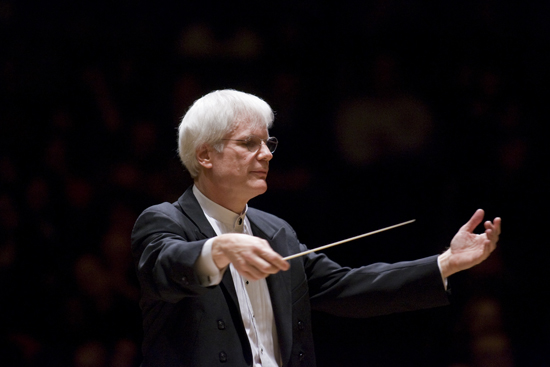The past is prologue for Collage New Music’s bold season opener
“The key to the understanding of contemporary music lies in repeated hearings,” the composer Roger Sessions wrote in 1950. “One must hear it till it sounds familiar.”
The four works heard on Collage New Music’s first concert of the season have had their day in the sun, each benefiting from multiple performances. Indeed, three of the pieces—Joan Tower’s Noon Dance, John Harbison’s Samuel Chapter, and Andrew Imbrie’s Spring Fever—are past CNM commissions. Though not literally new, the music still managed to sound as bold and enticing at Pickman Hall Sunday night as if the scores were fresh from the printers.
The most contemplative work of the evening was Jonathan Harvey’s Song Offerings (1985) for soprano and chamber ensemble. Its thin, fabric-like textures complemented the Buddhist composer’s choice of text, four Hindi poems by Rabindranath Tagore. The work’s musical language is haunting, its effect otherworldly.
The first of the set opened with the ensemble supplying a silvery blanket of sound that slid gradually upward in pitch over the course of the song. Soprano Mary Mackenzie, with breathy voice, added a chill to the music’s ghostly veneer. Especially impressive were the wide melodic leaps that make up the second song, which the singer delivered with live-wire intensity. The shimmering layers of the third were woven from delicate vocal lines and instrumental motives, which hung in space like light though a church window. Mackenzie and the ensemble gave the music sensitive treatment. But the gem of the setting was the final of the set, which dealt with the theme of death. There, Mackenzie’s silvery strands of speech and melody flowered from the glisten of whistling high notes, the vocalises encircling the stationary pitches like vines around a tomb stone.
The evening’s other vocal work, John Harbison’s Samuel Chapter (1978), is a powerful setting of a text from the Old Testament Book of Samuel. The coming-of-age story, as the composer noted, concerns the young prophet choosing adult responsibility over the comfort of childhood. Much of the piece’s stirring, bold-color melodies are driven by the stilted speech rhythms of the King James Bible, with motives from the vocal lines echoed in the Pierrot-like ensemble, a technique Steve Reich would later mine in Different Trains.
Harbison’s music is an alluring mix of dark, angular lyricism and palpitating harmonic rhythm. Mackenzie sang with bright, focused tone, her phrases sounding with authoritative presence to capture the voice of God. She was equally adept in her singing for Samuel, where she softened her tone effectively to capture the youth’s tender innocence. Through it all, conductor David Hoose and the ensemble laid a sturdy frame of accompaniment.
Composed in 1996, Andrew Imbrie’s Spring Fever is a barnstormer of a work. In Sunday night’s performance, the music’s darting melodic figures often took on the lean, uptown sophistication of contemporary jazz. The opening movement featured crisscrossing melodies that flitted through the ensemble, the agitated music only coming to rest on chords of Bartókian density. The fitful second movement began as a scherzo. Yet the light pizzicatos in the cello were answered, unexpectedly, by a soft, slow-woven web of phrases in the upper strings and winds. Later in the movement, motor rhythms that originated in the lower strings shifted suddenly to a yearning theme in the oboe, which was warmly played by Peggy Pearson.
The gnarliest music came in the finale. There, side-winding piano riffs grinded against the ensemble’s punchy chords. Bassist Todd Seeber gave his cadenza a jazzy groove, which bounced like a Charles Mingus riff.
Likewise, the opener, Joan Tower’s Noon Dance (1982), is chock full of vital energy. It began with mutterings upon a single note, effortlessly traded between winds and strings before spreading in all directions. As the music progressed, sprightly trills in the flute and clarinet broke into streams of oscillating rhythm. Here too, the music took on an almost jazzy groove, which was carried over into three cadenzas, a searching cello line, a flourishing display of marimba chords, and knuckle-busting piano licks, all sharply handled by Joel Moerschel, Craig McNutt, and Christopher Oldfather respectively. Throughout, the musicians of Collage New Music played with agility, the music’s textures made clear by the ensemble’s crystalline playing.
Collage New Music will feature works by Augusta Read Thomas, Lansing McLoskey, Amy Beth Kirsten, Derek Bermel, and Richard Festinger 8 p.m. November 16 at Pickman Hall. collagenewmusic.org
Posted in Performances




